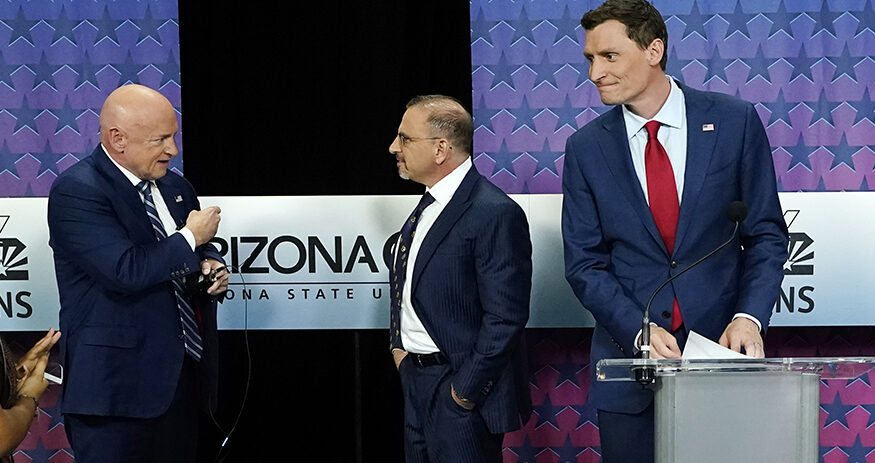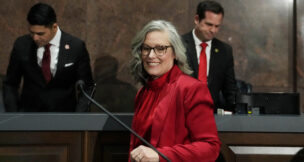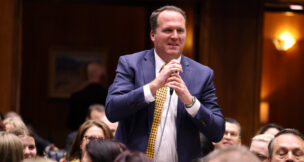Green Party, GOP state senator question new rules effectively barring Green Party from debates
Howard Fischer, Capitol Media Services//September 10, 2024//
Green Party, GOP state senator question new rules effectively barring Green Party from debates
Howard Fischer, Capitol Media Services//September 10, 2024//
The Green Party candidate for Senate may have been locked out of the upcoming televised debate based, at least in part, on incorrect information.
Chris Kline, president and chief executive officer of the Arizona Media Association, said last week that Green Party nominee Eduardo Quintana was not invited because he did not gain at least 1,239 votes in the primary. That is 1% of all votes cast in all primaries, the threshold set to be on stage with Democrat Ruben Gallego and Republican Kari Lake.
Kline acknowledged there are fewer than 3,400 registered with the Green Party. But he said that Quintana could have solicited votes from political independents to reach the goal.
But Quintana said that ignores one key fact: The Green Party runs a closed primary, allowing only Green Party adherents to cast a ballot. Put simply, he said, the debate rules crafted between the Arizona Media Association and the sponsoring Citizens Clean Elections Commission are skewed to keep minor parties from making their case in the debate.
“I wasn’t aware of that,” Kline said Tuesday. “But if that’s the case, that would have been a Green Party decision,” he said of the closed primary, something over which debate organizers have no control.
Quintana, however, told Capitol Media Services that’s not telling the whole story.
He pointed out that the published rules at the time the party decided to run a closed primary did not mention having to get a qualifying number of votes in the primary to participate in the general election debate sponsored by the commission.
Instead, the rules say only that write-in candidates do not get to participate, verbiage that suggests that once a candidate gains ballot status, participation in the general election debate is allowed.
“We didn’t get a heads up on the rule change until they implemented it,” Quintana complained.
Kline, for his part, said he is sticking with his plan for the Oct. 9 debate. He said that having just the two candidates who each gathered more than 400,000 votes in their respective primaries is the best use of the 56 minutes that the TV and radio stations in his organization are willing to provide.
But Kline may not get the last word.
Sen. Jake Hoffman, R-Queen Creek, is demanding answers from the Clean Elections Commission about exactly how and when these new restrictions were enacted. He contends that the rules are being ignored.
“At worst, the commission has broken the law,” Hoffman said.
What is clear is that, until this year, general election debates sponsored by the commission included all qualified candidates.
Two years ago, for example, Marc Victor, the Libertarian candidate for Senate, was invited to participate in the debate with Democrat Mark Kelly and Republican Blake Masters, even though Victor got just 3,065 votes in the primary.
Part of what changed is that the commission ended its partnership with KAET-TV, the Phoenix PBS outlet, in favor of a deal with the Arizona Media Association. Most of its TV and radio members have agreed to air the debate, Kline said, as have digital sites run by newspapers.
But Kline said they are not interested in giving up more than 56 minutes, all time that would be without commercials and their income. So he said his organization reached the deal with the commission to limit participants with those new rules and the 1% threshold.
None of this, he said is in any way related to a specific candidate or party.
“The message I’m sharing isn’t about whether we’re trying to include or exclude the Green Party candidate but more about the fact that what we are trying to do is ensure that we have general election debates with a finite number of candidates based upon a fair a system as we can possibly find with the lowest possible threshold in an electorate with millions of votes,” Kline said. And he continued to insist there are “multiple ways” that candidates could have reached that threshold.
Kline said he can’t speak to the decisions made by the Green Party.
“What I can say is that this is a guide we built for the whole election season,” he said. “There’s been no attempt on our side to exclude any particular candidates.”
But Kline is sticking with that 56-minute plan rather than extending it by a half hour, saying that is the “sweet spot” of what members were willing to give up.
“We can’t have a reasonable general election debate if we’re trying to give equal time to candidates that receive 200 votes out of over a million cast,” he said.
In the end, however, something may have to give.
Hoffman contends that the commission effectively repealed its rule on who can participate – the one that seems to lock out only write-in candidates – without actually going through the legally required steps of actually repealing the rule and adopting a new one. In fact, the old rule is still the only one published.
That raises the question of whether the commission can sanction and sponsor a debate that locks out Quintana.
“I don’t have the answer to that hypothetical because we’re already knee-deep into the general election where we’re executing these rules on multiple debates,” Kline said, debates where minor party candidates have not shared the stage. That includes the race for the Arizona Corporation Corporation Commission.
He said it would be unfair to now change the rules going forward for the Senate debate.
Tom Collins, the commission’s executive director, declined comment on whether he believes any rules are being broken. He said he will file a response later this week to Hoffman’s complaint.
Kline, called any question of whether the commission-sponsored debate will not be allowed to go on “hypothetical.” But he said that he is convinced the rules being used this time fall within what the commission is doing “does fall within the rules that they operate under.”










































